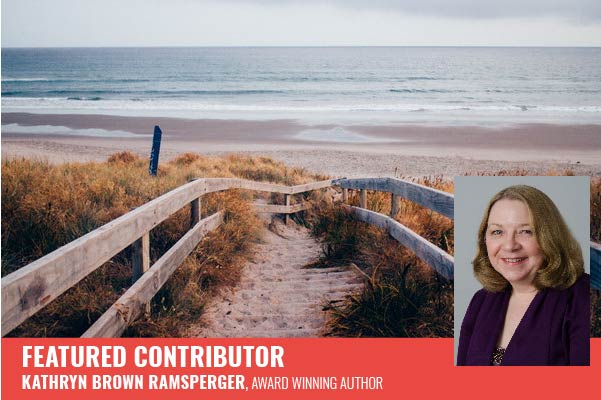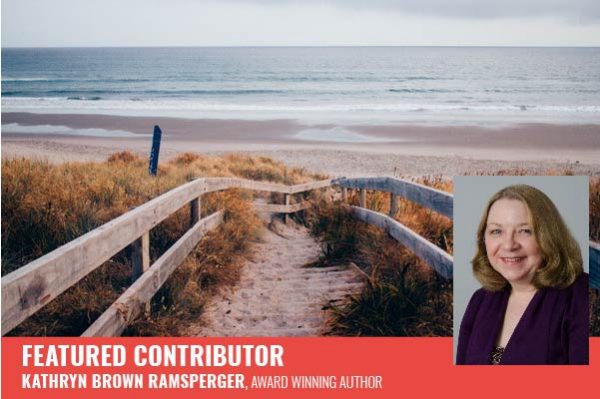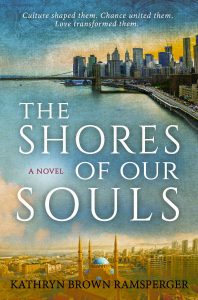
The Shores of Our Souls: A Christian-Muslim Love Story Inspired by 9/11
- By Kathryn Ramsperger --
- 28 Jul 2017 --

Kathryn Ramsperger shares the inspiration for her new book, The Shores of Our Souls, along with an excerpt.
I wrote my novel The Shores of Our Souls in answer to 9/11, whose shock waves continue to echo through our lives.
After the attacks in New York and my home, Washington, DC, the world gave a collective gasp as we focused on “Ground Zero” and the repeated, horrific media footage that portrayed it. Even then, I felt the media were missing the point: The world as we knew it was forever changed, but not destroyed. Each one of us was being called to step up to refashion this new world.
Muslims already faced prejudice, even danger. Twelve incidents in September 2001 alone that left several Arabs, Indians, and Pakistanis murdered. Most books and films I researched did not portray Arabs in any full, dynamic way. Of the more than 1,000 movies reviewed by Dr. Jack G. Shaheen (who died July 9, 2017, much to our loss), only 6 to 7 percent could be considered positive or non-offensive toward Arabs. Congratulations to one such current movie is The Big Sick. “If we cannot see the Arab humanity, what’s left?” Shaheen asked.
I wanted to change this perception in some small way, as only an American (bottle fed on Southern stories) humanitarian author can–by portraying two people trying to defy the odds of history, society, religion, culture, and their own fears and prejudices, to love each other. I wanted their love story to exist alongside the stories of war and terrorism, racism, and fear-mongering. Love and empathy (walking in another’s shoes) can lead to mutual understanding and help us resolve conflict. Art can teach us about empathy; love can lead us to ways to avoid conflict.
When I wrote, I simply allowed memory to play in front of me like a film: a cab driver in Beirut, a salesperson in Marrakech, the young pharmacist who gave me healing medicine, the Somali refugee, now a volunteer feeding other refugees, a Syrian who left university in the States to work for the Red Crescent to rescue victims of war in Beirut in 2006 (long before the Syrian civil war), the vendor who told me I had beautiful eyes, a dear friend from Senegal who held my infant son in his arms the week he was born, my dearest friend, of Syrian, Lebanese, and Armenian ancestry, who lived through the 1967 Six-Day War in Cairo.
These were some of the faces and voices that I called upon when I searched for material. The rest came from my imagination, spurred on by an image of two people meeting in a dark 1980s bar, complete with a disco ball and mirrors.
The Shores of Our Souls: An Excerpt
1946, Beirut. France grants Lebanon its independence.

My mother packs a long straw basket with good things to eat: hummus, bread, cheese, honey, lots of olives. I pop one in my mouth as I pass the table. She smacks my hand, and I run out the door. I think how nice it will be to be as cold as this olive is. Its briny taste sits in my mouth long after I spit out the pit.
My brothers play football in the courtyard. I watch the ripple of muscle on flesh as they vie for the ball. “Move, Qasim!” Saif yells as he dribbles the ball with one foot and steps on my toes with the other. I back away, laugh at him to hide the tears that bite my eyes. Eight years my senior, Saif is already almost as tall as my mother; soon he will be as tall as my father. I wish I could be as tall as he. This does not seem to be my fate, though. My pet name is “Goat”: small, compact, rugged, hopping from place to place, all horns and hooves. That is who I have become, because I would not want to disappoint them.
I swing around the fig tree and scratch the itch on my neck that the wool of my vest creates. I kick some pebbles up in the air, watch them fall to earth. “Stop, Qasim!” yells Rayik. I kick some pebbles in his direction and run back into the house.
I scamper into my father’s library. There he sits in his leather chair, reading. A dim light tries to shine through leaded glass from the Tiffany lamp beside him. His library is the only dark room in the house, which is otherwise full of light. I crouch behind the table at the far end of the room, breathing in the dust and mold of old books and trying to become the shadow beneath me. The fan rotates its dull full circle above. Baba raises his head and inclines it toward me. I wonder if he has seen me, but he picks up pen and paper. He is working again. He is always working, it seems. He rubs his chin and adjusts his reading glasses after he finishes each thought.
“Baba?” I whisper, and when I receive no answer, I say it with conviction: “Baba!”
He looks up, his expression a bit startled, a bit perplexed. “Qasim?”
“Baba, can we go to the seaside now?” I whine.
“Qasim, you need to ask your mother that question.”
“But Baba…” I want to stomp my foot, but I know better.
“Let me finish this, habibi.” He dips his fountain pen and begins to write once more.
I sigh but run out of the room back toward the kitchen. “What time will we leave, Mama? Are we almost prepared to leave?”
“Qasim, your questions delay, not hasten, me.” My mother smooths her apron along the detailed seams of her full skirt and pushes up at the silk sleeves that run down to her slender wrists. She pushes a stray strand of thick, wavy black hair behind her ear and runs a delicate hand across her forehead. She begins to roll a yellow damask tablecloth into a perfect cylinder. “Go outside and bring me some figs. We could use some figs.”
I roll my eyes but make certain she cannot see me in my insolence. I run out again, banging the door behind me. “Qasim!” my mother reprimands me.
“Qasim!” my brother shouts. “I thought you were gone!”
I shimmy up the slender tree trunk before he can catch my sandal, and I begin to pluck figs. If he catches hold of me, I know he’ll muss my hair to incite my mother’s wrath. I throw a couple of pebbles from my pocket down at him, and he runs back to his game. I reach for the tree’s top branches, where I can savor both figs and sunlight. The secret is to eat only as many as will not be missed. The tree bends a bit with my weight, and I grab one last delicious morsel. I dread the day my weight should become too much for the tree. I would dare not break a branch from this tree; it is my father’s favorite, planted when he was but a boy.
“Qasim!” my mother calls. “Where are those figs? We’re ready to leave!”
I jump the last few feet to the ground, upsetting a few figs, which my brothers rush to grab and thrust into their mouths. My mother waits at the door, her hand on her hip.
“But where is Baba?” I ask Mama.
She swings her heavy basket over her arm and gives each of us a bundle to carry—beasts of burden, all of us. “He will join us when he can, Qasim. Hurry!”
We step from the cool mosaic tile of our home into the bustle of the narrow street. My mother catches hold of my hand as we scurry down the alleyways on the edge of the West Side, her heels clicking on the rose-colored walkways as we pass through our neighborhood. There’s the greengrocery, now the café, where we sometimes sit and drink chocolate glacés, there’s the little man who sells coal in the winter and ice in the summer. My mother pulls me past the midday clamor of the souqs, and finally, just as the red tile roofs of the Ottoman section of the city come into view, we can catch the scent of the sea. It overtakes the lingering scent of cardamom and myrrh as we step on the trolley that will take us down the hill to the seaside. I can make out other children running up and down the sand below.
One boy has a white cloth on a string, but there is not enough wind to carry his makeshift kite to the azure sky. It catches a breeze, tilts to the right, to the left, and then topples on its side, defeated. The boy does not give up hope though. He is already running against the wind again. I find myself cheering him on under my breath. “Come on! Let go! Now! Let it catch!” No matter the reason, over and over again, the kite catches, flags, dies.
Rayik and I lie back on our blanket as the cool sea breeze whips through our hair. We are sated from food and play. Saif sits with my mother nearer the cliffs behind us. She reads to him from a book that looks boring enough. I pull my sandaled toes out of the sand, then dump sand on them again to cover them once more. “Mama won’t be happy you are getting your new sandals so dusty,” Rayik warns me.
I hear the smooth engine of Baba’s car before I can see it. It makes a great whir as he shifts down an incline. It is a big, black cavern of a car with a silver hood ornament that reminds me of a horse but is probably meant to be a dog. My mother hurries to gather our belongings into her basket and run up the hill so Baba will not need to wait long. Another day over, with Baba just getting here. I love him, and so I hate his work. I vow I will never take life so seriously that I cannot come down to the sea.
The Shores of Our Souls will be released on August 1, 2017.



















